Key takeaways:
- Vaccine hesitancy stems from fear, misinformation, and personal beliefs, highlighting the importance of open conversations and empathy in addressing concerns.
- Vaccinations not only protect individuals but also contribute to herd immunity and enhance public health by reducing disease prevalence.
- Personal experiences, shared stories, and support from community members can significantly influence one’s decision to overcome vaccine hesitancy.
- Reliable information from trusted sources, along with discussions with healthcare professionals and personal connections, can help alleviate fears and reinforce the decision to vaccinate.
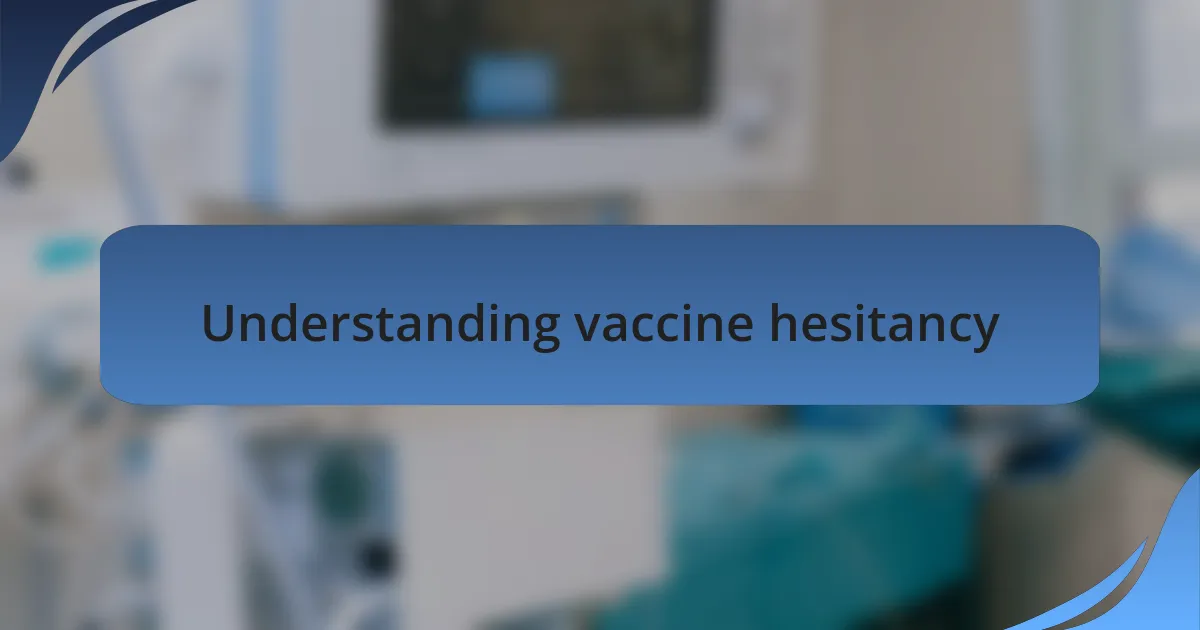
Understanding vaccine hesitancy
Vaccine hesitancy is often rooted in a combination of fear, misinformation, and personal beliefs. I remember sitting in a café, overhearing a conversation about how rapidly vaccines were developed. It made me realize that many people share the same concerns about safety and effectiveness. Why rush something so crucial, I thought? This doubt led me to explore the science behind vaccine development, which was an eye-opening experience.
On a more emotional level, the uncertainty surrounding vaccines can trigger deep-seated fears. I can’t forget the moment I confided in a friend about my worries. Her genuine response—sharing her own moments of doubt—made me feel less alone. Have you ever felt that sense of isolation when grappling with something like this? It’s important to acknowledge that we all have our worries and that communicating these feelings can lead to greater understanding.
Ultimately, understanding vaccine hesitancy isn’t about pointing fingers at ignorance; it’s about fostering honest conversations. Reflecting on my journey, I’ve learned that digging deeper into the reasons behind our hesitancies can open up pathways to connection. What if instead of judgment, we approached these conversations with empathy and curiosity? That shift in perspective can make all the difference in tackling vaccine concerns.
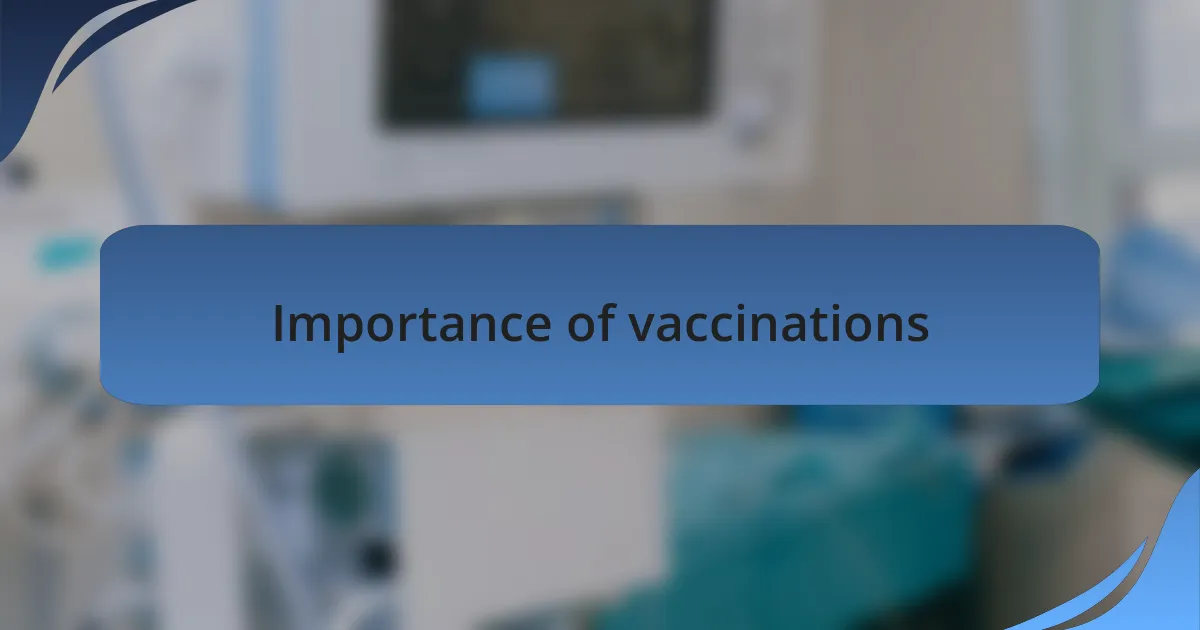
Importance of vaccinations
Vaccinations play a crucial role in safeguarding both individual and public health. I remember the day I received my vaccine; it was a moment filled with hope mixed with uncertainty. However, as I looked around at others, I realized we were part of something bigger—collectively protecting our community from serious diseases. It struck me that each needle represents not just personal safety, but a layer of protection for vulnerable populations.
The science behind vaccines is compelling. They work by training our immune system to recognize and fight off infections without exposing us to the dangers of the disease itself. I often find myself reflecting on the history of vaccines and the lives they’ve saved; diseases that once caused widespread suffering now feel remote because of these remarkable medical innovations. Isn’t it astonishing to think how something small can have such a profound impact on our lives?
As I navigated my own hesitancy, I often wondered about the emotional toll associated with the decision to vaccinate. The fear of potential side effects can loom large, but I’ve come to understand that the risks of not vaccinating can be far greater. Personal anecdotes from friends who had loved ones affected by preventable diseases resonated deeply with me. Their stories made me question my own hesitance—was it worth the risk of returning to a world where outbreaks were more common? This reflection ultimately fueled my decision to embrace vaccination as a critical tool for health, both for myself and for my community.
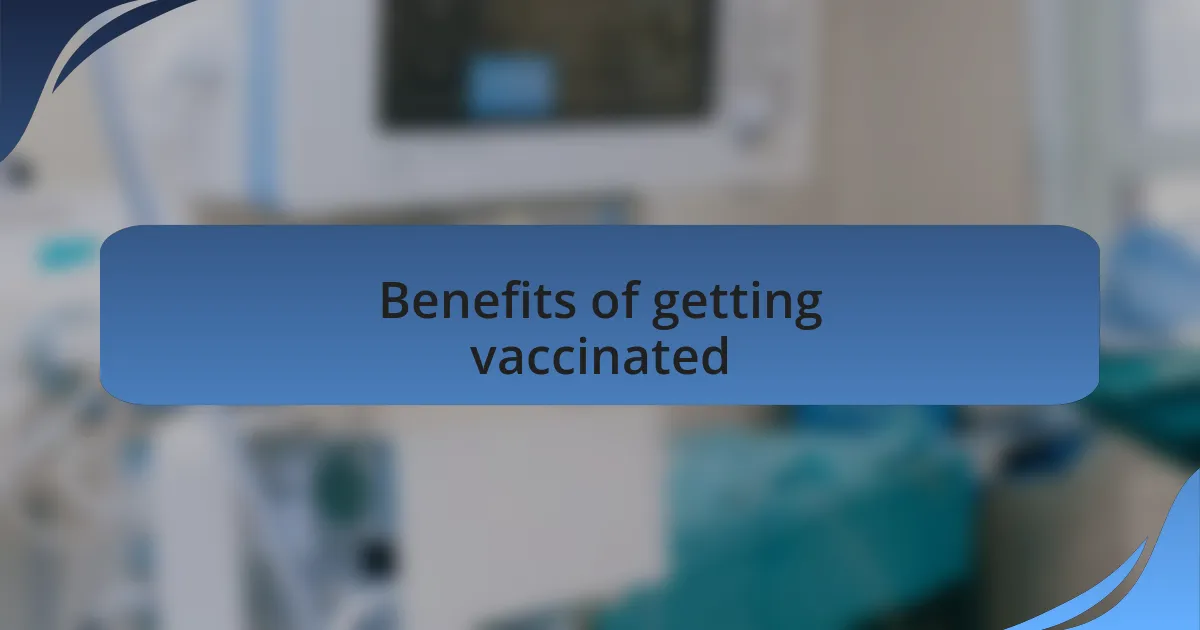
Benefits of getting vaccinated
Getting vaccinated brings a multitude of benefits that extend beyond the individual. I recall the moment when I realized that receiving my vaccine meant I was contributing to herd immunity. It was empowering to know that my choice helped protect those who couldn’t be vaccinated due to health conditions. Don’t you find it rewarding to think that your actions can help safeguard the most vulnerable among us?
Another significant benefit of vaccination is the reduction of disease prevalence. This past year, I noticed fewer flu cases in my community, and I can’t help but attribute some of that to better vaccination rates. It made me reflect on how vaccinations not only protect me but also create a healthier environment for everyone. It’s a cycle of positivity—when more people get vaccinated, we all enjoy a better quality of life.
Finally, I’ve found that getting vaccinated not only addresses physical health but also brings peace of mind. After my shots, I felt a wave of relief knowing I was taking proactive steps against severe illness. It made me question: what other uncertainties could I tackle if I embraced this mindset? Embracing vaccination helped shift my perspective from fear to empowerment, reminding me that we have the tools to protect ourselves and one another.
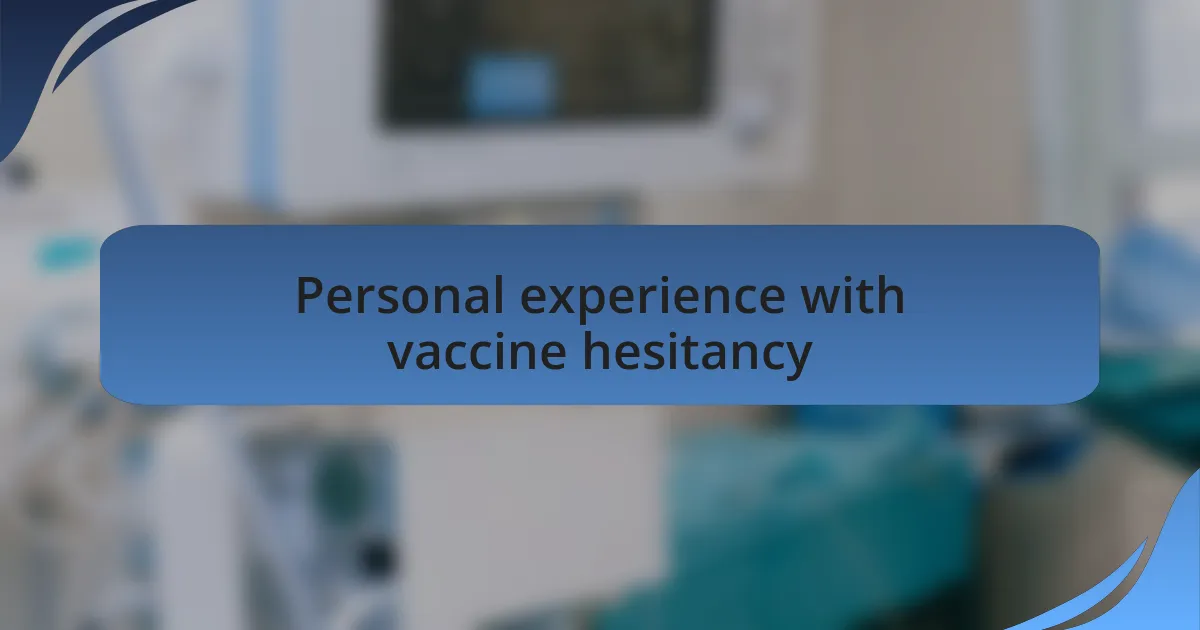
Personal experience with vaccine hesitancy
Before I decided to get vaccinated, I found myself caught in a whirlwind of information and misinformation. I remember scrolling through social media, feeling more confused than ever. The doubts crept in—was the vaccine truly safe? It took some deep self-reflection, but I began to realize that my anxieties weren’t just fears; they were reflections of the uncertainties we all faced during this chaotic time.
One pivotal moment for me was when a close friend shared her vaccination story. She spoke so passionately about how getting vaccinated made her feel more connected to her family and community. Listening to her experience stirred something within me—a longing for that connection myself. I thought, could a simple shot really bridge that gap? Gradually, I recognized that giving in to my hesitancy meant missing out on those crucial human connections.
After finally getting vaccinated, I experienced an unexpected sense of liberation. The heaviness of doubt lifted, replaced by a newfound clarity. It was incredible to feel that I was taking control of my health while also doing my part for others. That transformation made me ponder: if I could overcome this fear, what other challenges could I conquer? The experience taught me that facing my vaccine hesitancy opened doors to empowerment and resilience.
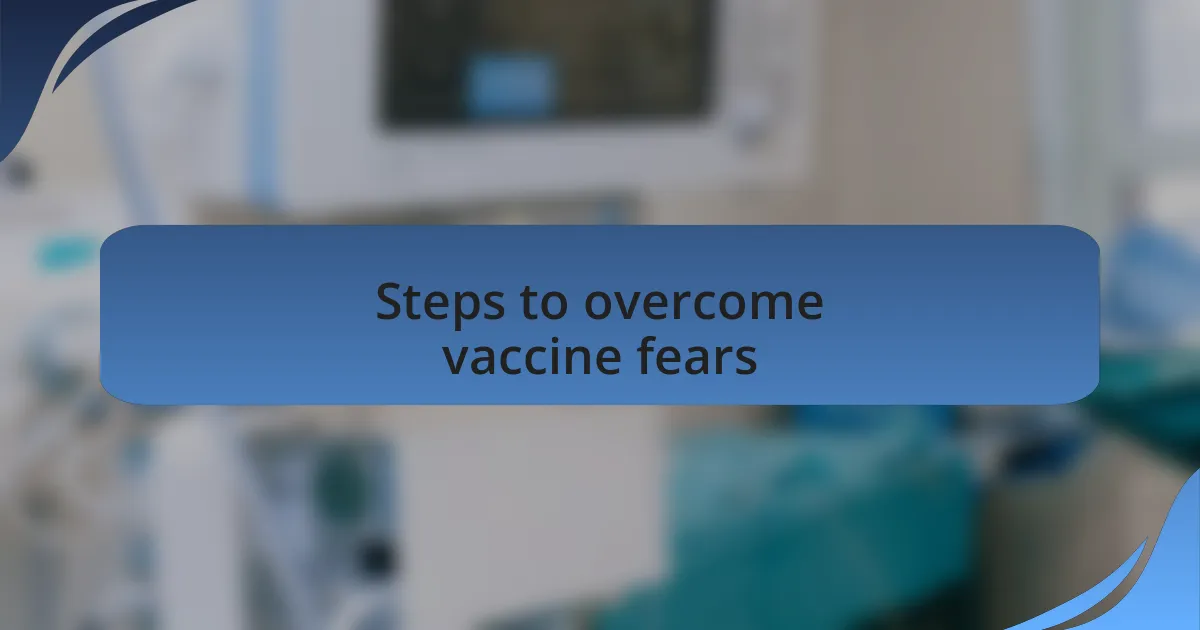
Steps to overcome vaccine fears
One effective step I took to overcome my vaccine fears was educating myself from reliable sources. I found that diving into materials from the CDC and WHO not only demystified the vaccine’s safety but also outlined the benefits. I remember the sense of relief I felt when I discovered that the rigorous testing processes were designed to protect us. Could understanding the facts help ease my anxiety? For me, the answer was a resounding yes.
Another important step for me was talking to healthcare professionals. I had a candid conversation with my doctor who patiently addressed all my concerns. Hearing the science behind the vaccine and sharing my specific fears made it feel more like a discussion than an interrogation. I realized that being honest about my hesitations was key to overcoming them.
Finally, I found it beneficial to connect with others who had shrugged off their vaccine hesitancy. Joining local community groups where people shared their vaccination journeys was inspiring. I felt a wave of camaraderie as others voiced similar doubts only to find strength in community support. Isn’t it comforting to know that we can overcome our fears together? By sharing experiences, we not only heal ourselves but often uplift those around us as well.
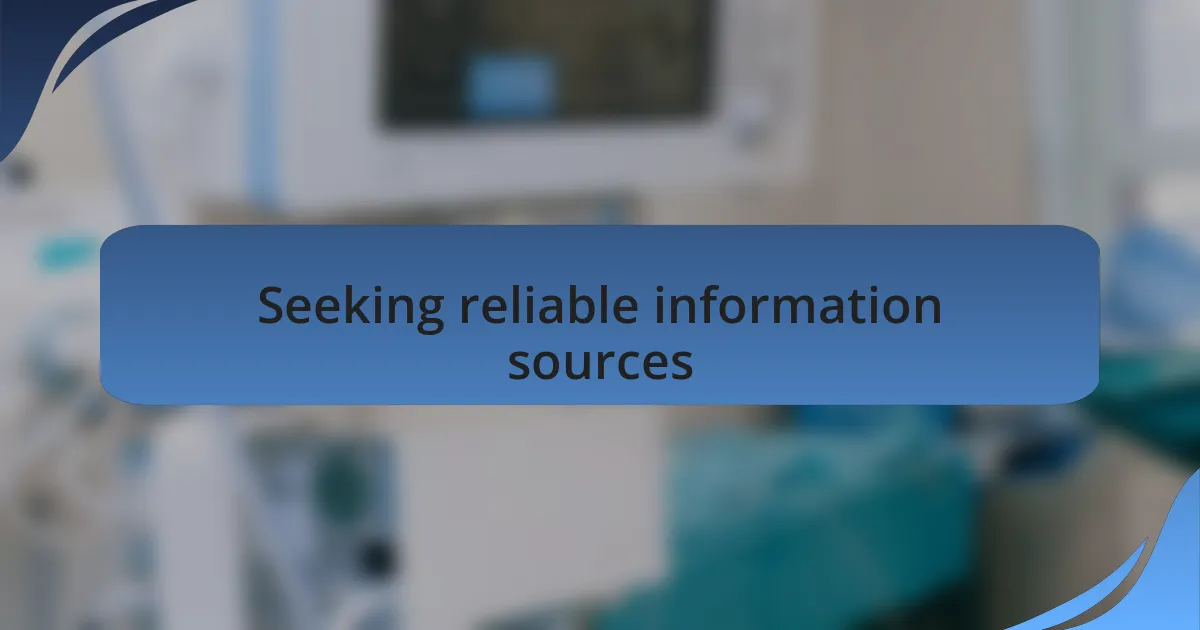
Seeking reliable information sources
In my journey, finding trustworthy information was crucial. I turned to official websites like the CDC and WHO, and I remember feeling empowered by the precise details they provided. Did you know that these organizations explain the science behind vaccines in clear language? It was a relief to see that even complex information was laid out in a way that I could easily grasp.
As I explored various sources, I made it a point to verify the credibility of what’s out there. Social media can be a double-edged sword; while it sometimes offers support, it can also confuse with misinformation. I found that comparing multiple reputable sources helped me see a clearer picture. How did that shift happen for me? By critically assessing the information, I found peace of mind, knowing I was basing my decisions on facts rather than fears.
Talking to friends and family also played a pivotal role. Some of them had already been vaccinated and shared their experiences, which complemented the cold data I was reading. Listening to their stories about feeling safe and protected made the abstract worries dissipate. Isn’t it amazing how personal stories can make the statistics feel more human? Their insights reinforced my resolve, showing me that we all can conquer our fears when we lean on each other for guidance.
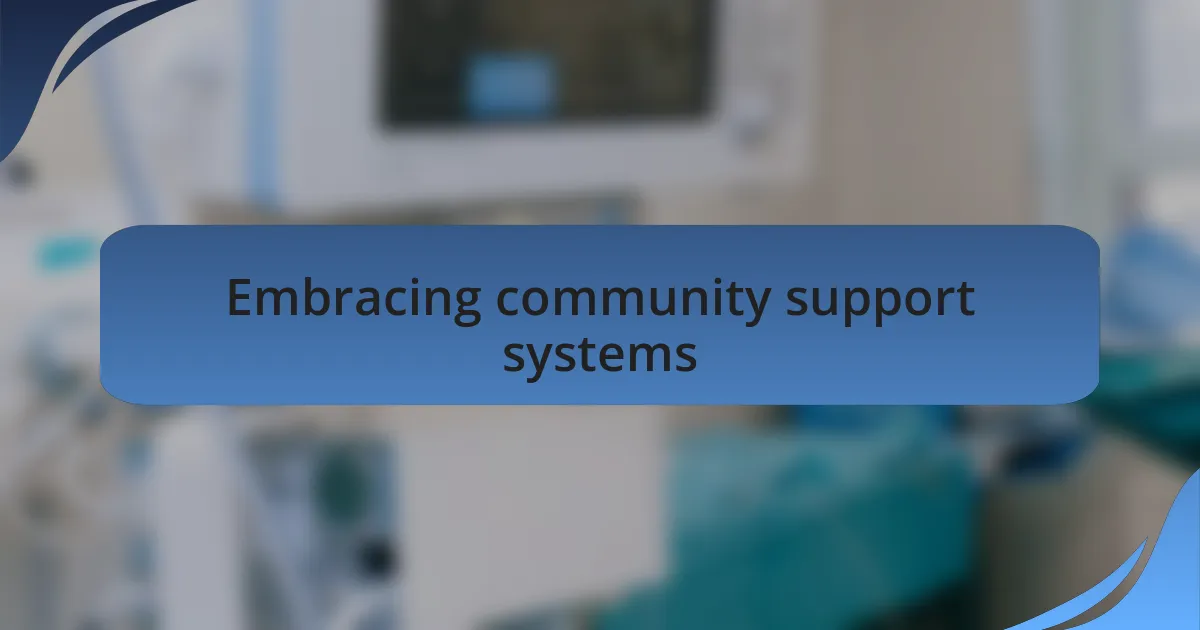
Embracing community support systems
As I navigated my vaccine hesitancy, the importance of community support became apparent. I vividly recall a local gathering where people shared their vaccination experiences. Hearing my neighbor’s story about overcoming her initial fears truly resonated with me. It made me wonder—how many others are feeling the same way but just haven’t voiced it yet?
I also realized that community support isn’t just about sharing personal stories; it’s about creating a safe space for discussion. A few close friends organized a small discussion group focused on vaccines. I felt a sense of camaraderie there, which was uplifting. It was intriguing to witness how an open dialogue could transform anxiety into understanding, allowing us all to find reassurance together.
These connections in my community worked wonders for my mindset. Engaging with others not only illuminated the collective apprehensions we shared but also reinforced the fact that we were in this together. When you see someone else step forward confidently, doesn’t it encourage you to do the same? For me, it was heartening to remember that facing challenges collectively strengthens our resolve and fosters trust in the decisions we make.